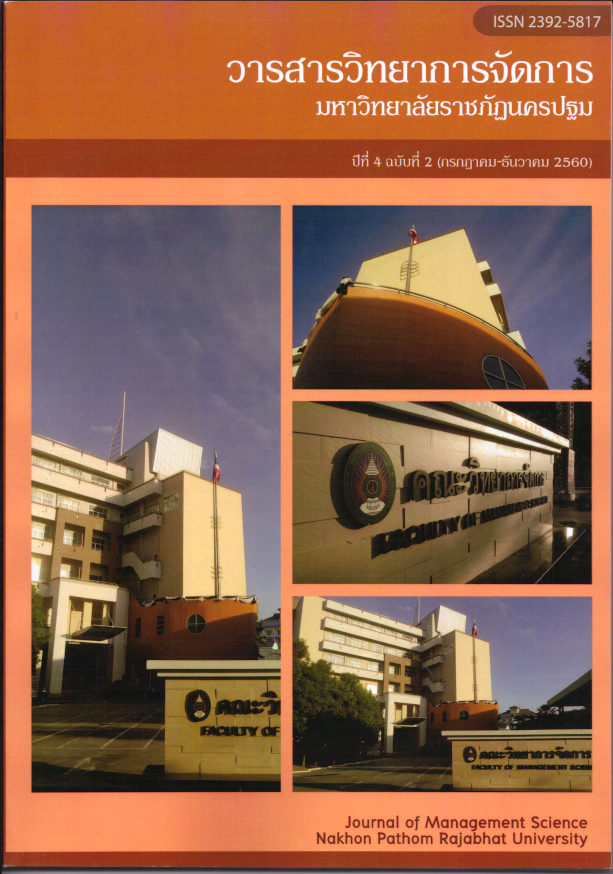Relationship between welfare and organizational commitment from the viewpoint of employees of the automotive maintenance and repair shops in Nakhon Pathom Province.
Main Article Content
Abstract
This research aimed to: 1) study the level of welfare and organizational commitment of employees of the automotive maintenance and repair shops in Nakhon Pathom Province; 2) compare opinions on welfare and organizational commitment of employees of the automotive maintenance and repair shops in Nakhon Pathom Province as classified by personal factors; 3) study relationship between welfare and organizational commitment of employees of the automotive maintenance and repair shops in Nakhon Pathom Province; and 4) study opinions on guidelines for promoting welfare and organizational commitment of employees of the automotive maintenance and repair shops in Nakhon Pathom Province. The research samples were 310 employees of the automotive maintenance and repair shops in Nakhon Pathom Province, derived by simple random sampling and 10 interviewees, derived by purposive sampling. The research instruments were a questionnaire and interview form constructed by the researcher. Data were analyzed with frequency, percentage, mean, standard deviation, t-test, and one-way analysis of variance, pair difference test by using Scheffe’s method, correlation coefficient and content analysis. The findings of this research were as follows:
1. Welfare from the viewpoint of employees of the automotive maintenance and repair shops in Nakhon Pathom Province
1.1 Welfare from the viewpoint of employees of the automotive maintenance and repair shops in Nakhon Pathom Province was overall ranked at a moderate level in the descending order as follows: convenience, economy, and recreational aspect.
1.2 Employees of the automotive maintenance and repair shops with different gender, and age had no difference in opinions towards welfare. Whereas, those with differences in marital status, and highest educational level, working experience, features of work, and average monthly incomes had difference in opinions towards welfare with statistical significance at .05.
2. Organizational commitment from the viewpoint of employees of the automotive maintenance and repair shops in Nakhon Pathom Province
2.1 Organizational commitment from the viewpoint of employees of the automotive maintenance and repair shops in Nakhon Pathom Province was overall at a moderate level ranged respectively from the highest to the lowest as follows; attitude, norms of society, and behavioral aspect.
2.2 Employees of the automotive maintenance and repair shops with different gender and features of work had no difference in opinions towards organizational commitment. Whereas, those with differences in age, marital status, and highest educational level, working experience, and average monthly incomes had difference in opinions towards organizational commitment with statistical significance at .05.
3. Welfare and organizational commitment of employees of the automotive maintenance and repair shops were highly positively correlated with statistical significance at .01.
4. Recommended guidelines for promoting welfare and organizational commitment of employees of the automotive maintenance and repair shops were as follows: encouraging the provision of recreational facilities for employees; organizing work features seminars and workshops to improve employees’ skills and enhance employees’ competencies valuable to work performance; determining the appropriate salary structure adjustment; treating employees as family members; and attempting to reconcile employees' perceptions to exponentially enhance the level of organizational commitment of employees of the automotive maintenance and repair shop.
Article history : Accepted 16 March 2017
SIMILARITY INDEX = 2.80
Article Details
The views and opinions of the article appearing in this journal are those of the author. It is not considered a view and responsibility of the editorial staff.
References
กรมโรงงานอุตสาหกรรม. (2557). ข้อมูลโรงงานแยกตามพื้นที่. ค้นเมื่อ 3 ตุลาคม 2557, จาก https://www2.diw.go.th/factory/tumbol.asp.
กุลธน ธนาพงศธร. (2544). การพัฒนาทรัพยากรมนุษย์ในองค์การ. นนทบุรี : มหาวิทยาลัยสุโขทัยธรรมาธิราช.
จรินทร์ เสือโต. (2551). ปัจจัยที่มีผลต่อความพึงพอใจด้านสวัสดิการของพนักงานบริษัท เรเซอร์การไฟฟ้า (ประเทศไทย) จำกัด. พระนครศรีอยุธยา. มหาวิทยาลัยราชภัฏพระนครศรีอยุธยา.
เมธี ศาสตร์สาระ. (2550). ปัจจัยที่มีผลต่อความพึงพอใจด้านสวัสดิการของพนักงานบริษัทนิโปร (ประเทศไทย) จำกัด. ภาคนิพนธ์บริหารธุรกิจมหาบัณฑิต. สาขาวิชาการจัดการทั่วไป. บัณฑิตวิทยาลัยมหาวิทยาลัยราชภัฏพระนครศรีอยุธยา.
ศิริวรรณ เสรีรัตน์. (2545). องค์การและการจัดการ. กรุงเทพฯ : ธรรมสาร.
ธันยพร ลาภทิพมนต์. (2556). อิทธิพลของแรงจูงใจในการทำงาน การรับรู้การสนับสนุนด้านสวัสดิการและจริยธรรมในองค์กรที่มีต่อพฤติกรรมการเป็นสมาชิกที่ดีขององค์กรผ่านความผูกพันต่อองค์กรด้านจิตใจของพนักงานโรงแรมและรีสอร์ทในเครือเซ็นทารา สำนักงานใหญ่. วิทยานิพนธ์บริหารธุรกิจมหาบัณฑิต สาขาวิชาการประกอบการ บัณฑิตวิทยาลัย มหาวิทยาลัยศิลปากร.
ธีรภัทร วาณิชพิทักษ์. (2555). การศึกษาความผูกพันต่อองค์การของพนักงานบริษัทร่วมเจริญพัฒนา จำกัด. วิทยานิพนธ์บริหารธุรกิจมหาบัณฑิต สาขาวิชาบริหารธุรกิจ. บัณฑิตวิทยาลัย มหาวิทยาลัยราชภัฏพระนคร.
สุวิมล ติรกานันท์. (2553). ระเบียบวิธีการวิจัยทางสังคมศาสตร์ : แนวทางสู่การปฏิบัติ. (พิมพ์ครั้งที่ 8). กรุงเทพฯ : โรงพิมพ์แห่งจุฬาลงกรณ์มหาวิทยาลัย.
อิทธิศาสตร์ อินทรโชติ. (2551). ความผูกพันของพนักงานต่อองค์กรในนิคมอุตสาหกรรมภาคเหนือ จังหวัดลำพูน. การศึกษาค้นคว้าอิสระศิลปศาสตร์มหาบัณฑิต. สาขาวิชาเศรษฐกิจและการเมือง. บัณฑิตวิทยาลัย มหาวิทยาลัยเชียงใหม่.
Allen, N. J. & Meyor, J. P. (1993, January). Organizational commitment : Evidence of career stage effect. Journal of Business Research, 26, 17.
Hinkle, D. E, William, W. & Stephen, G. J. (1998). Applied statistics for the behavior sciences (4th ed.). New York : Houghton Mifflin.
Krejcie, R. V. & Morgan, D. W. (1970). Determining sample size for research activites. Educational and Psychological Measurement, 30 (3), 607-610.
Likert, R. R. (1961). New patterns of management. New York : Graw-Hill Book Company.
Saks, A. M. (2006). Antecedents and consequences of employee engagement. Journal of Managerial Psychology, 21 (6), 600-619.


